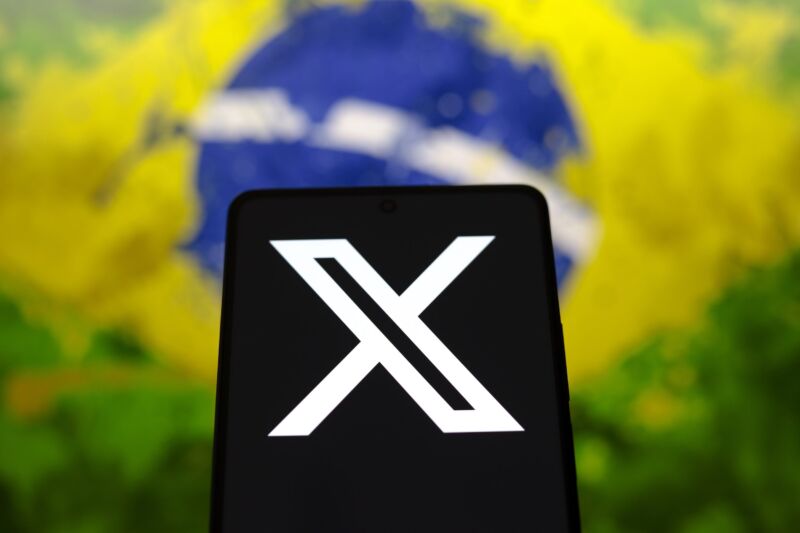
Getty Images | SOPA Images
Elon Musk’s Starlink broadband service said it would defy an order to block Musk’s X platform in Brazil after the country’s top court required Internet providers to block the site. SpaceX’s Starlink division, which says it has 250,000 customers in Brazil, reportedly told the country’s telecom agency on Sunday that it will not comply with orders to block X.
Starlink said last week that a Brazilian court order “freezes Starlink’s finances and prevents Starlink from conducting financial transactions in that country… based on an unfounded determination that Starlink should be responsible for the fines levied—unconstitutionally—against X. It was issued in secret and without affording Starlink any of the due process of law guaranteed by the Constitution of Brazil.”
Starlink said it would “address the matter legally,” and its refusal to block X appears to be part of an attempt to get its assets unfrozen. “On Sunday, Starlink informed Brazil’s telecom agency, Anatel, that it would not block X until Brazilian officials released Starlink’s frozen assets, Anatel’s president, Carlos Baigorri, said in an interview broadcast by the Brazilian outlet Globo News,” according to The New York Times.
Musk wrote that “unless the Brazilian government returns the illegally seized property of X and SpaceX, we will seek reciprocal seizure of government assets too.”
Months-long clash comes to a head
Supreme Court Judge Alexandre de Moraes ordered the suspension of X, formerly Twitter, on Friday and gave ISPs five days to block the service. A Brazilian Supreme Court panel of five judges, including de Moraes, unanimously upheld the decision on Monday.
X was ordered to be “blocked for refusing to name a local legal representative, as required by law,” and “will stay suspended until it complies with [the judge’s] orders and pays outstanding fines that as of last week exceeded $3 million,” the Associated Press wrote. X “has clashed with de Moraes over its reluctance to block users and has alleged that de Moraes wants an in-country legal representative so that Brazilian authorities can exert leverage over the company by having someone to arrest,” the AP wrote.
The judge also said that people who use VPN services “to circumvent the blackout and use X could face fines of nearly $9,000 a day, more than what the average Brazilian earns a year,” the NYT wrote. De Moraes initially ordered Apple and Google to remove X and VPN apps from their app stores but withdrew that part of the order.
“People across Brazil quickly criticized the move against VPN apps, and about three hours later, Justice Moraes issued an amendment to the order, this time leaving out the directives to Apple and Google,” another NYT article said.
De Moraes is a powerful figure who was described by the Associated Press last year as a “crusading judge” who “tests [the] boundaries of free speech in Brazil.”
“He has jailed people without trial for posting threats on social media; helped sentence a sitting congressman to nearly nine years in prison for threatening the court; ordered raids on businessmen with little evidence of wrongdoing; suspended an elected governor from his job; and unilaterally blocked dozens of accounts and thousands of posts on social media, with virtually no transparency or room for appeal,” a January 2023 New York Times profile of de Moraes said.
X claims it isn’t defying Brazil law
X’s Global Government Affairs account alleged last week that de Moraes targeted the platform “simply because we would not comply with his illegal orders to censor his political opponents… When we attempted to defend ourselves in court, Judge de Moraes threatened our Brazilian legal representative with imprisonment. Even after she resigned, he froze all of her bank accounts.” X closed its office in Brazil in August after the incident.
The dispute goes back to April, when Musk threatened to disobey an order to suspend dozens of accounts accused of spreading disinformation. “Justice Moraes had ordered that X accounts accused of spreading disinformation—many of which belonged to supporters of the former right-wing president Jair Bolsonaro—must be blocked while they are under investigation,” the BBC wrote.
Musk has called himself “a free speech absolutist.” But before completing his Twitter purchase, Musk indicated he would comply with each country’s censorship laws. “By ‘free speech,’ I simply mean that which matches the law. I am against censorship that goes far beyond the law,” he wrote at the time.
X claimed it is not defying Brazilian law. “We are absolutely not insisting that other countries have the same free speech laws as the United States. The fundamental issue at stake here is that Judge de Moraes demands we break Brazil’s own laws. We simply won’t do that,” X’s Global Government Affairs account wrote.
